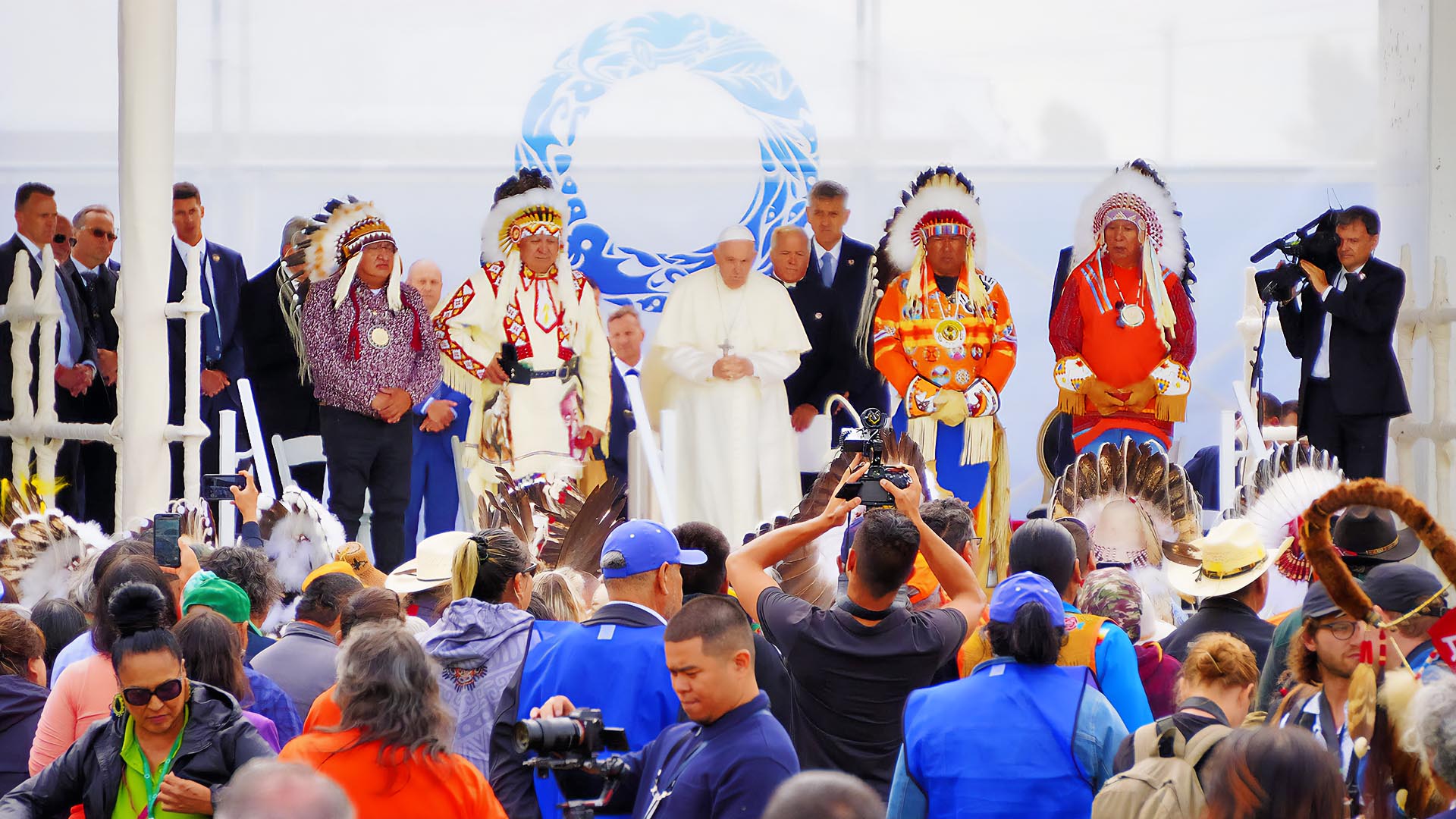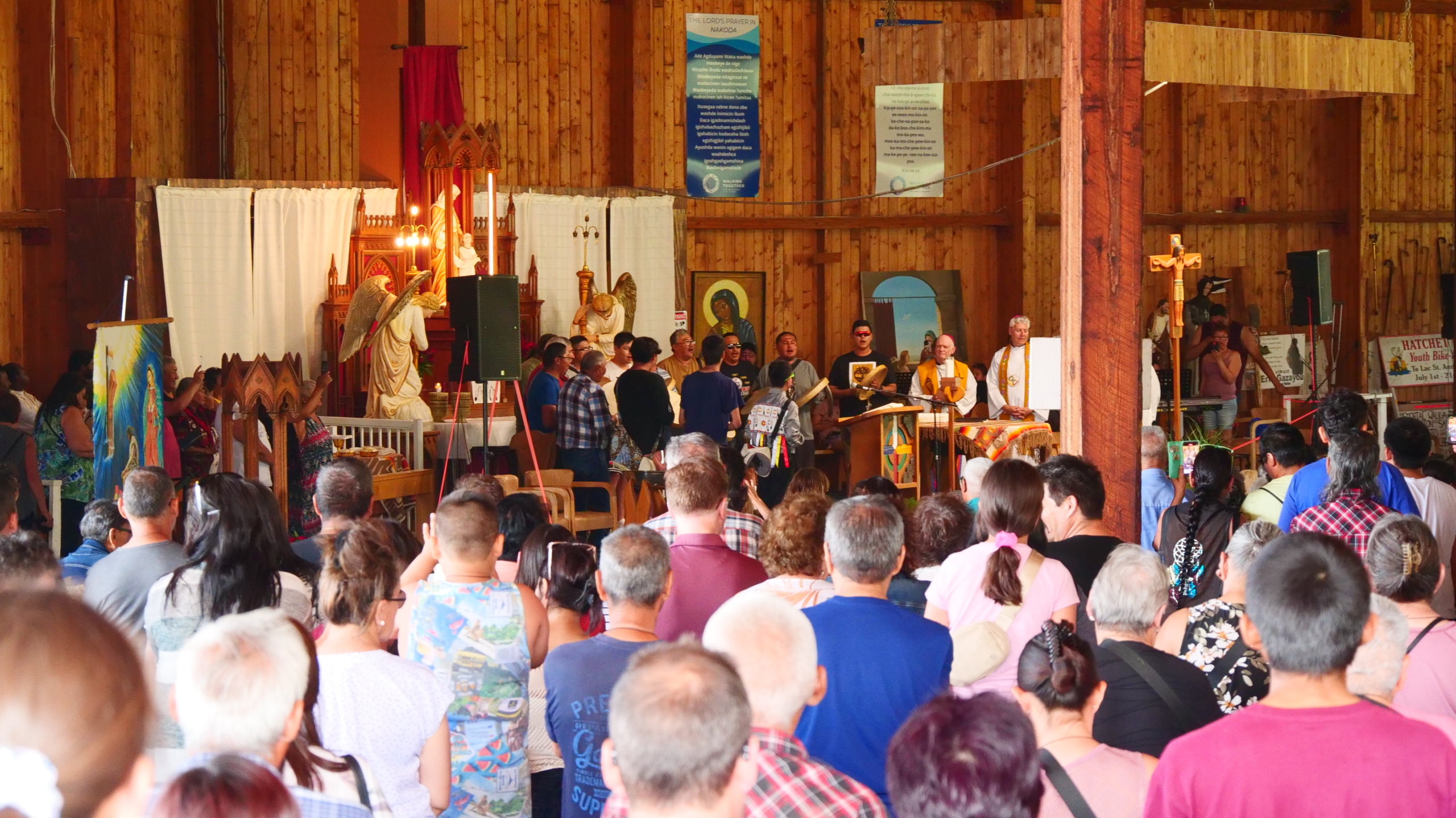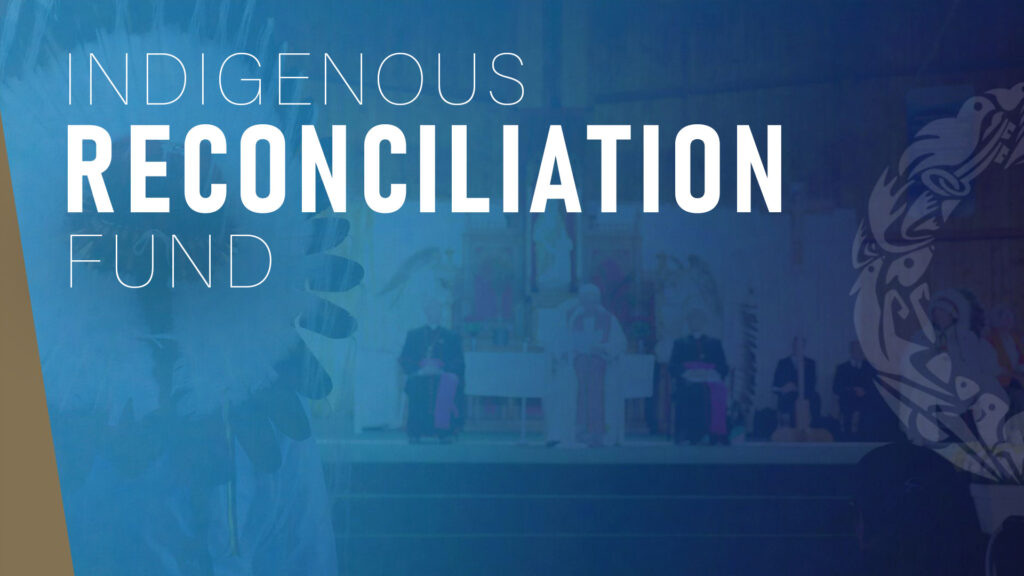
What is the Indigenous Reconciliation Fund (IRF)?
The Indigenous Reconciliation Fund, a national initiative, was established to accept donations from 73 Catholic entities across the country, and to advance healing and reconciliation initiatives, fulfilling the $30 million financial commitment made by Canada’s Bishops in September 2021.
The fund seeks to support projects that are determined locally, in collaboration with First Nations, Métis and Inuit partners. The Indigenous Reconciliation Fund has established the following criteria for grant applications:
- Healing and reconciliation for communities and families;
- Culture and language revitalization;
- Education and community building; and
- Dialogues for promoting indigenous spirituality and culture.
The fund has been designed to meet the highest standards of transparency and good governance and is overseen by a Board of Directors made up of Indigenous leaders.
To date, the Indigenous Reconciliation Fund has raised $14,099,813.74, putting the fund on track for its five-year, $30 million commitment. To learn more about the National Indigenous Reconciliation Fund, visit their website at www.irfund.ca
How is the Archdiocese involved with the Indigenous Reconciliation Fund?
In February 2022, the Archdiocese of Edmonton announced its commitment of $3.2 million over five years. In addition, many people have expressed their desire to make a personal contribution toward this effort. There were two special parish collections on the weekends of March 5-6 and March 12-13, 2022. Those who wish to continue to donate may make a gift online.
Papal visit anniversary: We continue to walk together towards reconciliation
As we mark two years since Pope Francis’ historic visit to Canada, the Archdiocese of Edmonton continues to support and advance healing and reconciliation programs with First Nations, Metis and Inuit Peoples.
“The anniversary of the Holy Father’s penitential journey is a reminder that we are walking together on the path towards truth, healing and reconciliation. Our First Nations, Metis and Inuit brothers and sisters of this land continue to lead the way. We know that reaching our destination will take time and prayer, as well as action,” said Archbishop Richard Smith, who was the general co-ordinator of the papal visit to Canada July 24-29, 2022.
“We are very blessed to have such a diversity of programs and initiatives that respond to the various needs that exist among Indigenous Peoples in our local area. I am grateful for the support of the people of the Archdiocese.”
Read Archbishop Smith’s homily on the second anniversary of the papal visit

The Archdiocese is fulfilling its $3.2-million commitment to the national Indigenous Reconciliation Fund by supporting 34 programs and initiatives. The Indigenous Reconciliation Fund focuses on four key areas: healing and reconciliation for communities and families, culture and language revitalization, education and community building and promotion of Indigenous spirituality and culture.
The local programs and initiatives include:
- Decolonizing Wellness: Empowering Indigenous Youth, a program at the Telus World of Science exploring topics such as nutrition, body physiology, traditional Indigenous sports, land-based survival, plant medicines and astronomy.
- The Mother Bear Wellness Project, a series of healing retreats tailored to meet the mental health needs of Indigenous youth, adults, families, and Elders.
- Catholic Social Services’ Indigenous Cultural Programs for Children, Family and Community
- An Elders’ Retreat at Our Lady of Seven Sorrows Parish, a Catholic community of Indigenous people in Maskwacis, recognizing the importance of preserving and honouring the wisdom of Elders
- Indigenous cultural workshops at Sacred Heart Church of the First Peoples, including Indigenous-led beading classes, drumming and Cree language classes
Through the National Indigenous Reconciliation Fund, the Catholic Bishops of Canada have committed, in their dioceses, to raising $30 million over five years to support local initiatives in every region of Canada. Half that goal, or just over $15 million, has been raised to date, well in advance of the anticipated timeline.
Read Canadian bishops’ statement on the second anniversary of the papal visit
Which projects have been approved?
Thirty-four projects within the area of the Archdiocese of Edmonton support a national commitment towards healing and reconciliation with First Nation, Inuit and Métis people.
The Indigenous Reconciliation Discernment Circle, whose members are local indigenous leaders, recommended these projects and initiatives focused on healing and reconciliation for communities and families; culture and language revitalization; as well as education and community building. The projects have been approved by the national Indigenous Reconciliation Fund committee.
Project |
Organization |
Amount |
| Rise Up: Braided Perspectives | Alberta Native Friendship Centres Association | $249,984 |
| Indigenous Cultural Programs for Children, Family and Community Services (CFCS) | Catholic Social Services – Sign of Hope | $49,200 |
| Indigenous Women’s Health | Covenant Foundation (Covenant Health) | $182,000 |
| Connecting Roots | Edmonton Aboriginal Seniors’ Centre | $250,000 |
| 4 Directions Equine Wellness | Edmonton Catholic Schools, Indigenous Learning Services, Braided Journeys | $200,000 |
| Decolonizing Wellness: Empowering Indigenous Youth | Edmonton Space & Science Foundation (TELUS World of Science -Edmonton) | $125,000 |
| Leagues of Play – Indigenous Student Success | Ever Active Schools | $82,000 |
| Indigenous Liaison Worker | Greater St. Albert Catholic Schools | $225,000 |
| Mother Bear Wellness Project | Heart Spirit Healing and Wellness | $250,000 |
| Dagucayami Inishnobgē: Lac Ste Anne Alexis Tipi Monument | Hill Plain Construction Services b/o Alexis Nakota Sioux Nation | $250,000 |
| Finding the Missing Children: Supporting Indigenous Communities Using Technology to Search IRS Sites | Institute of Prairie and Indigenous Archaelogy, University of Alberta | $250,000 |
| Catchment Kookum | M.E. LaZerte High School: on behalf of the 16 catchment schools within EPS | $49,938 |
| Healing Pavilion | Our Lady of Mercy Parish | $250,000 |
| Cree hymn singing | Our Lady of Seven Sorrows Parish | $5,000 |
| The Rosary in Cree | Our Lady of Seven Sorrows Parish | $5,000 |
| Indigenous Teachings | Our Lady of Seven Sorrows Parish | $5,000 |
| Teepee Church | Our Lady of Seven Sorrows Parish | $23,000 |
| Cursillo Weekends | Our Lady of Seven Sorrows Parish | $26,000 |
| Drumming and Singing | Our Lady of Seven Sorrows Parish | $30,000 |
| Elders’ Retreat | Our Lady of Seven Sorrows Parish | $30,000 |
| Prayerful Art | Our Lady of Seven Sorrows Parish | $30,000 |
| Healing Workshop Regarding Residential Schools | Our Lady of Seven Sorrows Parish | $35,000 |
| Beading Classes | Sacred Heart Church of the First Peoples | $22,100 |
| Elders (Presence) Ministry to the Homeless | Sacred Heart Church of the First Peoples | $17,500 |
| Indigenous Teachings on Culture and Spirituality | Sacred Heart Church of the First Peoples | $11,700 |
| Drumming Workshops (children) | Sacred Heart Church of the First Peoples | $14,200 |
| Bannock Making | Sacred Heart Church of the First Peoples | $14,950 |
| Cree Lessons | Sacred Heart Church of the First Peoples | $18,050 |
| Outreach Ministry Program | Sacred Heart Church of the First Peoples | $20,000 |
| Sewing Class | Sacred Heart Church of the First Peoples | $21,000 |
| Drumming Lessons | Sacred Heart Church of the First Peoples | $24,150 |
| Bringing Us Together, Baree Uguzhum, Mamawi Payin | St. Albert Parish | $6,400 |
| Supporting Indigenous Ways of Being | The Family Centre of Northern Alberta (Assoc.) | $96,000 |
| Transformative Reconciliation Ceremony – Tipi Building in the Spirit | The Red Road Healing Society | $100,000 |
| TOTAL | $2,968,172 |
How will my donation be utilized in working with the national Indigenous Reconciliation Fund?
The fund seeks to support projects that are determined locally, in collaboration with First Nations, Métis and Inuit partners. The IRF has established the following criteria for grant applications:
- Healing and reconciliation for communities and families;
- Culture and language revitalization;
- Education and community building;
- Dialogues for promoting indigenous spirituality and culture; and
- Youth leadership.
The fund has been designed to meet the highest standards of transparency and good governance and is overseen by a Board of Directors made up of Indigenous leaders.
Local Catholic dioceses identify the priority of meaningful reconciliation work as determined by local Indigenous groups and organizations. An Indigenous Reconciliation Discernment Circle has identified projects within the area of the Archdiocese of Edmonton, review and approve applications and ensure transparency and good governance.
Discernment Circle
An Indigenous Reconciliation Discernment Circle has identified projects within the area of the Archdiocese of Edmonton, and reviewed and approved applications to ensure transparency and good governance.
“History cannot be erased, but together we can look forward to – and help create – a better future,” said Cam Alexis, chair of the Indigenous Reconciliation Discernment Circle and a member of the Alexis Nakota Sioux Nation.
“I think the spirituality and culture is very important because that is part of the Church’s reconciliation as well. It is to recognize that as a holistic way of healing. Even the Pope visited us last summer, and all of this is the concept of healing and coming back to the Church as well for prayer.”
The Indigenous Reconciliation Discernment Circle in the Archdiocese of Edmonton is Indigenous-led, with representation from First Nations, Metis and Inuit partners. The Circle is also supported by an Elder, former Samson Cree Nation Chief Victor Buffalo.
Contact
If you have any questions, please e-mail Marion.Haggarty-France@caedm.ca

